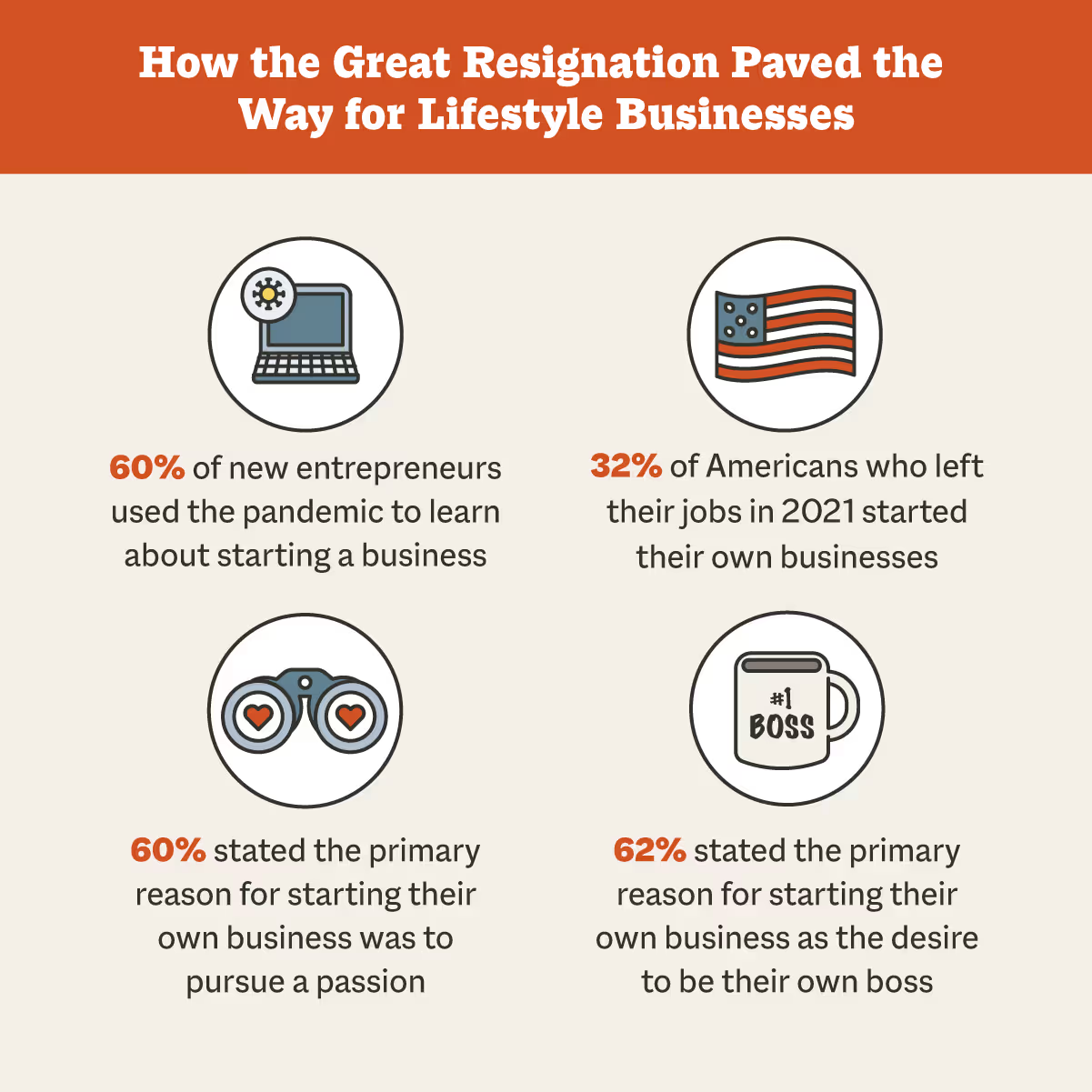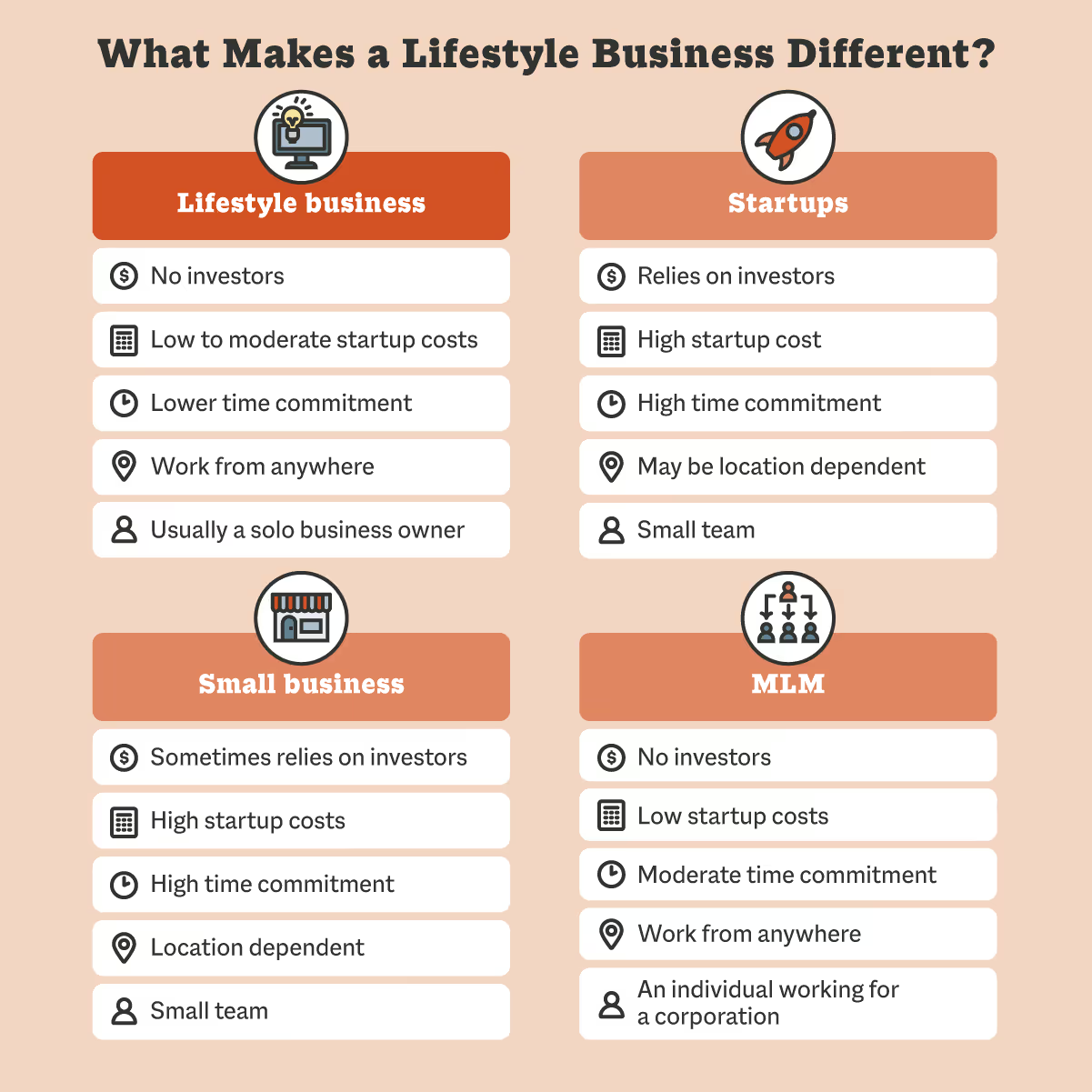What is a Lifestyle Business + 8 Tips to Start One
What is a Lifestyle Business + 8 Tips to Start One

Are you dreaming of the day you get to walk out of your stuffy 9-to-5 desk job and not look back? Well, you don’t have to wait until retirement to see that happen. If you have a skill or hobby you’re passionate about, why not turn that into a lifestyle business?
We’ve seen major shifts in the workplace since the pandemic hit, including the 32% of Americans who left their jobs in 2021 to start their own businesses. While 20.5 million Americans were forced into unemployment after the first COVID-19 wave in 2020, many others left willingly. We saw the Great Resignation brought on by workers who began to rethink their careers, work conditions, and self-worth. Lifestyle entrepreneurs were a portion of those who left careers during the Great Resignation.
It might be scary to do what can seem like uprooting yourself to build a lifestyle business. Thankfully, you don’t have to go at it alone. There are numerous resources — like this article and the infographic below, other business owners, and outsourced help — to get you through it. This guide will cover the lifestyle business definition and how this type of company varies from other business models, as well as offer eight tips for how to build a successful lifestyle business.

What is a lifestyle business?
Freedom is a core American belief, but often we gloss over the fact that careers can sometimes impede on living where you want and having a flexible schedule. A lifestyle business is a passion-centered business founded by someone who desires to be their own boss and live with more freedom
Most lifestyle businesses allow founders to lean into their creativity and personal talents. They are demanding upfront, relying on the founder’s passions, skills, and motivation to kick off. Once the business begins to see rewards, it can generate enough profit to allow the founder to live and work from anywhere.
Additionally, the startup costs for lifestyle businesses are fairly low. The costs depend on what the business offers, but regardless, you won’t spend hundreds of thousands of dollars to get started, which is why lifestyle businesses don’t rely on financial investors.
For example, say someone wants to build out an online course on how to use Adobe Creative Suite. They likely already have a subscription to the tools if they are familiar enough with them to teach others, and there are no physical products involved.
Some lifestyle businesses earn a passive income more easily than others, allowing founders to put in minimal hours once they get rolling. For example, the Adobe Creative Cloud online course maker will put in hours after hours initially when in the creating phase, but once the course is complete, they spend less time working while the sales roll in.
There are three categories most lifestyle businesses fit into — information marketing, service-based businesses, and e-commerce. The models vary in what the business offers as a product or service.
Information marketing
An information marketer is an expert in an area or is passionate about a topic and desires to teach others about that thing. The topic could be anything from a common problem within a given industry to pure entertainment. Influencer and affiliate marketing also fit within this category.
Information marketers are typically digitally based businesses. Their products may come in the form of:
- Online courses
- E-books
- Live coaching
- Podcasts
- Audio interviews
- Blogs
- Software
Service-based businesses
Service-based businesses also don’t rely on selling a physical product, but instead sell the business owner’s skills. Most services that can be executed remotely can be turned into a lifestyle business, making a long list of potential business ideas. A few examples include:
- Graphic design
- Freelance writing
- Virtual assistance
- Digital marketing
- Web design
- Proofreading and editing
- Voiceovers
- Bookkeeping
- Social media management
- Data entry
If the business begins to scale and hire employees to fulfill clients’ service requests, it begins to stray away from being a lifestyle business, which are run by solo operators or within a small, usually family-based, team.
E-commerce businesses
E-commerce is the only lifestyle business type that sells a physical product. Beyond the products, all you really need are a website with a shop function or a third-party online shopping platform like Etsy, and some social media marketing skills.
The most successful e-commerce lifestyle businesses are those that keep their operations small and niche. Living and working from anywhere are the main concepts behind a lifestyle business. For example, it may be easier to work from anywhere when your product is small or digital. If you grow into needing a larger workspace or inventory area, you may limit your ability to work and live from anywhere. You may be able to get around this by hiring a third party to manage the space for you.
How is a lifestyle business different from other business types?
Lifestyle businesses differ significantly from most other small businesses in funding, flexibility, and growth potential.

Startups
Startup companies get their beginnings by developing an innovative, usually tech-oriented, product or service. Because of the high startup costs, this type of business usually requires venture capital funding from investors. It often takes years for a startup to see a return on investment, but once the return comes to fruition, it may come in millions or billions of dollars. Google, Amazon, and Facebook all began as startups.
Startups require a high time commitment from the founder to see the rewards later. Startup teams begin small but grow when the founder chooses to scale or sell. They may or may not be dependent on a location depending on the business. In fact, many startups made the switch to a virtual workplace — if they weren’t already — once the COVID-19 pandemic hit.
This type of business couldn’t be more different from lifestyle businesses — they’re opposites on almost all factors.
Small businesses
Small businesses also sell a service or product and usually find profitability within a year or two. Small businesses require a high amount of time and money upfront from the owner to get things moving. Funding usually comes from the owner’s savings or from a bank loan. Social media is very important for small businesses to market their offerings.
Some small businesses could be classified as lifestyle businesses, depending on what the small business sells. If a small business is e-commerce-based, then it might fall under a lifestyle business — for example, a business owner who sells handmade jewelry on an online shopping retailer. Those with only brick-and-mortar storefronts aren’t considered lifestyle businesses since they are location dependent and founders can’t work from anywhere.
Multi-level marketing (MLM)
Multi-level marketing (MLM) is a business model direct sales companies use to sell their products to consumers. There is a corporation at the top that makes the products, and individual business owners — members — market and sell the products on behalf of the corporation, making a commission from each sale.
Owners in MLM businesses are required to pay very little upfront costs, but what is spent usually comes from buying the company’s products. The time commitment varies on the individual and how much of a return they want to see. The more time and work they put in, the higher the return, typically. Since most marketers under MLM businesses rely on social media, business owners can work from anywhere.
8 Tips for running a successful lifestyle business
The life of a lifestyle entrepreneur can seem exciting and desirable, but fear holds back many from taking the plunge into getting started. Starting a business venture can be intimidating with the unknowns of whether you’ll be a success or not. Try implementing these steps and tips to help you reach your goals with a new lifestyle business.

1. Find your passion
Many lifestyle businesses start from passions. When starting a lifestyle business, focus on what you’re good at and what you enjoy doing. In doing so, you can make an income from hobbies.
Keep in mind, not all hobbies translate into business ventures. You may risk turning something you once enjoyed into something that brings you stress or only associating it with work.
2. Take action
For some, business ideas may flow in a steady stream, but it’s easy to run through this list and put off the ideas that could actually be something. In order to get started, you actually have to get started. Don’t keep pushing off your dreams of being a business owner. It’s time to bite the bullet!
3. Identify your niche and target audience
Niches and target audiences are equally important to businesses. Having a niche helps a business identify itself, whereas a target audience helps a business identify who its customers are.
A niche is a business’s focus or specialization in products and services. For instance, a graphic designer who sells their printable templates might focus on the wedding signs niche.
Lifestyle businesses work best when you can reach a global market, but you still need to have a particular target audience. For example, if you want to write online courses, decide who will be taking your courses. Will your course be for other business owners, or are you creating a homeschooling curriculum for stay-at-home parents?
When solidifying your target audience, you’ll need to understand your buyer’s psychographic information, like personal values and beliefs, and demographic information, like age and occupation. These factors can help you offer better products and services and market your goods to that specific audience.
4. Build your brand
Beyond identifying your niche, it’s wise to build your brand as well. A brand identity is all of the elements that help make a company who it is at its core. You want to build a brand image that will stick out to consumers and be memorable. Once you have an established brand, the harder it is to make adjustments.
In building your brand, you’ll want to identify your business’s name, logo, and overall image. Choose a memorable business phone number. Take some time to work on this. Color psychology can help you understand how your image might make customers feel. Once complete, implement your brand elements across your digital platforms, like your company website and social media.
5. Start off on a third-party platform
Instead of starting off by only selling your products or services on your own website and social media, try getting established on a third-party platform first. It will likely be easier for potential customers and clients outside of your current network to find you if you are using one of these platforms to market your business.
This can be applicable to most types of lifestyle businesses. There are platforms for lifestyle entrepreneurs to sell both products and services. For example, Etsy is a great place for e-commerce businesses selling printed T-shirts, while UpWork is a great place for service-based businesses, such as ghostwriters.
6. Outsource mundane or unfamiliar tasks
When you’re a one- or two-person show, getting everything done — especially as you take on more clients — can be a challenge. You might struggle to find time to check your books or get back to customers in a timely manner. Lifestyle businesses are meant to grant the life of freedom; you don’t want to be stuck working 24/7 on the areas of business that don’t excite you. This is where outsourcing help may come in handy.
To keep your lifestyle business true to its core, try hiring virtual help like Smith.ai for these tasks. For lifestyle businesses, Smith.ai’s virtual receptionists offer services like website chat monitoring, payment collection, and phone answering. Your time is best spent serving your customers through product creation, so leave the mundane tasks you’re unfamiliar with to outsourced assistants.
7. Network, network, network
Networking is important for business owners, whether they’re just starting out or they’ve been in the game for decades. Many entrepreneurs find success in business networking at chamber of commerce events, pop-up events, industry conferences, or even on social media. You may find business owners who offer similar products or services to yours, but instead of focusing on the competition, build them into your network for friendly support.
Some benefits of business networking are:
- Learning from others’ successes and failures
- Mentorship
- Getting sales referrals
- Finding suppliers
- Expanding your network
- Increasing your confidence
8. Ask for feedback
One of the best ways to grow both as an individual and as a lifestyle business is through feedback. Knowing what you’re doing well and where you can improve can help you make informed decisions on your products and services and your business’s future.
You might find the best feedback comes from return customers, lost sales leads, and other business owners. Depending on whom you’re asking for feedback, you might send out a survey or a review request or just ask in networking conversations.
Start your lifestyle business
Whether your passion lies in financial podcasting or interactive web design, building a lifestyle business lets you live the life you want, all by making an income doing what you actually love. In the infographic below, you’ll find more tips and advice on building a lifestyle business, as well as apps to manage your business’s daily operations.
Some of the tools we recommend that are beneficial for a wide variety of business types are:
Check out the full infographic below.

Book a call today to learn more about Smith.ai’s full list of customer engagement services, and see how we can help take extra tasks off your plate so you enjoy the perks of running a lifestyle business.
Sources: Investopedia
Take the faster path to growth. Get Smith.ai today.
Key Areas to Explore

Your submission has been received!














.svg)



